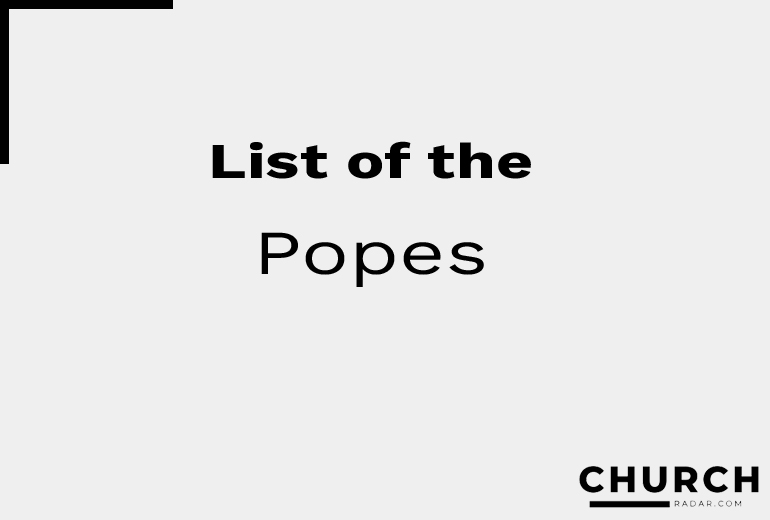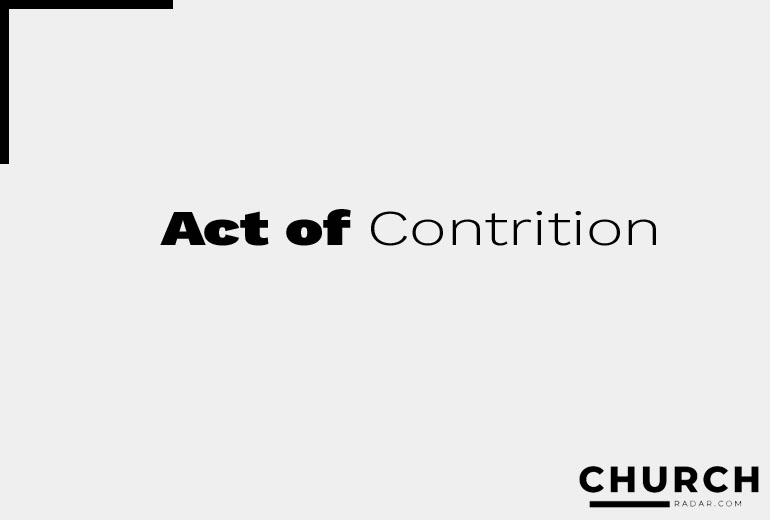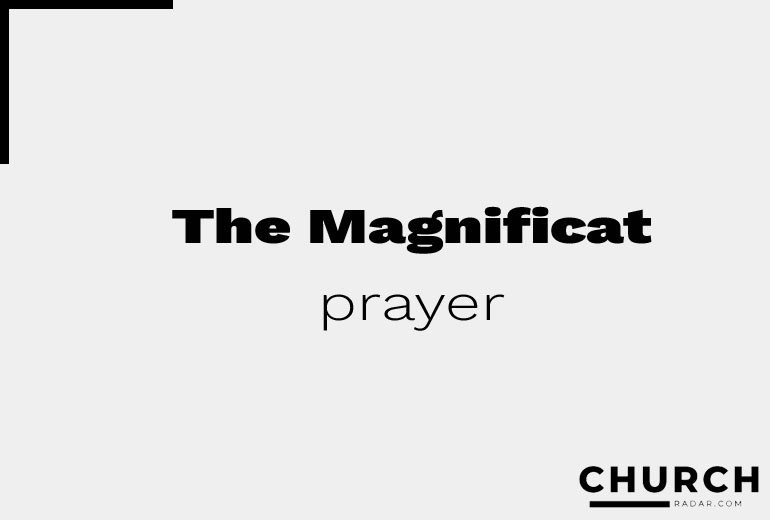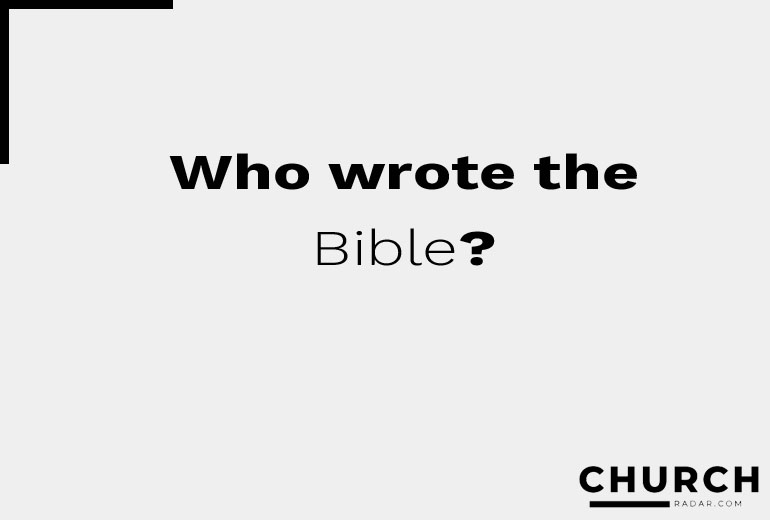List of the Popes
- 2023-10-27 by
- ChurchRadar

List of the Popes A Comprehensive Guide to the Succession of Roman Catholic Pontiffs
Welcome to an intriguing journey into the world of the Papacy, where we will delve into its origins, significance, and the remarkable individuals who have held this esteemed office throughout history. In this comprehensive article, we will explore the early days of the Papacy, uncovering the lives and contributions of the first pontiffs. We will also unveil the fascinating process behind papal elections and succession, shedding light on how a new Pope is chosen.
But that's not all - get ready to discover the impact of notable popes throughout history, as we examine their influential legacies. From great reformers to visionary leaders, these pontiffs have shaped not only the Catholic Church but also left an indelible mark on society as a whole.
However, no exploration of the Papacy would be complete without acknowledging its controversial side. Prepare yourself for revelations about scandalous and infamous popes who have tested the limits of their power and authority.
Finally, we will bring our journey into modern times by analyzing the contributions and reforms made by recent pontiffs. These modern popes have faced unique challenges in an ever-changing world and have sought to guide their flock with wisdom and compassion.
So join us as we embark on this captivating exploration of one of history's most enduring institutions - The Papacy. Get ready to be captivated by stories that span centuries and leave you wanting more.
- List of the Popes
- Introduction to the Papacy: Tracing the Origins and Significance of the Papal Office
- Early Popes: Exploring the Lives and Contributions of the First Pontiffs
- Papal Elections and Succession: Unveiling the Process of Choosing a New Pope
- Notable Popes Throughout History: Examining the Impact of Influential Pontiffs
- Controversial Popes: Shedding Light on Scandalous and Infamous Pontiffs
- Modern Popes: Analyzing the Contributions and Reforms of Recent Pontiffs
List of popes since 1939
| Start year | End year | Number of days of Pontificate (max) | English name | Place of birth | Age at start of papacy | Age at end of papacy |
|---|---|---|---|---|---|---|
| 2013 | Francis I | Buenos Aires | 76 | |||
| 2005 | 2013 | 2,870 | Benedict XVI | Marktl am Inn, Bavaria, Germany | 78 | 85 |
| 1978 | 2005 | 9,658 | Ven. John Paul II (John Paul the Great) | Wadowice, Poland | 58 | 84 |
| 1978 | 1978 | 33 | Servant of God John Paul I | Forno di Canale, Veneto, Italy | 65 | 65 |
| 1963 | 1978 | 5,521 | Servant of God Paul VI | Concesio, Brescia, Italy | 65 | 80 |
| 1958 | 1963 | 1,678 | Bd. John XXIII | Sotto il Monte, Bergamo, Italy | 76 | 81 |
| 1939 | 1958 | 7,156 | Ven. Pius XII | Rome, Italy | 63 | 82 |
Introduction to the Papacy: Tracing the Origins and Significance of the Papal Office
The Papacy, or the office of the Pope, holds a significant place in the history of Christianity. It is an institution that traces its origins back to the early days of the Church and has played a crucial role in shaping religious and political landscapes throughout the centuries. Understanding the origins and significance of the Papal Office allows us to appreciate its enduring influence on both believers and non-believers alike.
From its humble beginnings with Saint Peter, who is considered the first Pope, to the present day, the Papacy has evolved and adapted to changing times. The Pope serves as the spiritual leader of millions of Catholics worldwide, providing guidance and moral authority on matters of faith and doctrine. Additionally, the Pope's position as head of state within Vatican City grants him diplomatic influence on global affairs.
The Papacy has weathered numerous challenges throughout history, including schisms, conflicts with secular powers, and internal reforms. Despite these obstacles, it remains a symbol of unity for Catholics around the world. The office carries immense weight due to its historical legacy and continues to be a source of inspiration for those seeking spiritual guidance in an ever-changing world.
Early Popes: Exploring the Lives and Contributions of the First Pontiffs
The early popes played a crucial role in shaping the development of the papacy and establishing its authority. One of the most notable early popes was Saint Peter, who is considered the first pope by tradition. As one of Jesus' apostles, Peter became the leader of the early Christian community and laid the foundation for the papal office. His martyrdom in Rome solidified the city's significance as the center of Christianity and set a precedent for future popes to follow.
Following Saint Peter, several other early popes made significant contributions to both religious and secular matters. Pope Clement I, who served in the late 1st century, is known for his letters to various Christian communities, providing guidance on matters of faith and discipline. Pope Leo I, also known as Leo the Great, played a crucial role in asserting papal authority during his pontificate in the 5th century. He successfully defended orthodox Christian beliefs against heretical teachings and negotiated with barbarian invaders to protect Rome.
These early popes not only established a line of succession but also laid down important theological foundations that continue to shape Catholic doctrine today. Their leadership helped solidify Rome as an influential center of Christianity and set a precedent for future popes to follow. By exploring their lives and contributions, we gain valuable insights into how the papacy evolved over time and its enduring significance within Catholicism.
Papal Elections and Succession: Unveiling the Process of Choosing a New Pope
The process of choosing a new pope, known as papal elections and succession, is a highly intricate and significant event within the Catholic Church. It is a process that has evolved over centuries and holds great importance in determining the future direction of the Church. The election of a new pope follows strict protocols and traditions, ensuring that the selection is carried out with utmost care and consideration.
At the heart of the papal election process is the College of Cardinals, a group of high-ranking clergy members who are responsible for electing the new pope. Upon the death or resignation of a pope, the cardinals gather in Vatican City to participate in a conclave, which is essentially a closed-door meeting where they deliberate and vote on who will become the next pontiff. This secretive nature of the conclave aims to foster an environment free from external influences, allowing for prayerful discernment and decision-making.
The voting process itself involves multiple rounds until one candidate receives a two-thirds majority vote. Each cardinal writes their choice on a ballot paper, which is then collected and counted. If no candidate receives enough votes in a round, further ballots are held until consensus is reached. Once a cardinal reaches the required majority, he becomes the new pope and takes on his chosen papal name. The announcement is made with iconic white smoke emerging from the Sistine Chapel chimney, signaling to the world that a new leader has been chosen.
Notable Popes Throughout History: Examining the Impact of Influential Pontiffs
Throughout history, there have been numerous popes who have left a lasting impact on the Catholic Church and the world. One such notable pope is Pope Gregory I, also known as Gregory the Great. Serving as pope from 590 to 604, Gregory was instrumental in expanding the influence of the papacy and strengthening the authority of the Church. He played a crucial role in converting pagan temples into Christian churches and sending missionaries to evangelize non-Christian territories. His contributions to liturgical music also led to the development of Gregorian chant, which remains an integral part of Catholic worship today.
Another influential pope in history is Pope Innocent III, who served from 1198 to 1216. During his pontificate, Innocent III exercised significant political power and played a central role in shaping medieval Europe. He called for crusades against heretics and non-Christians, asserting papal authority over secular rulers. Additionally, he convened the Fourth Lateran Council in 1215, which introduced important reforms within the Church and established new regulations for religious practices. Pope Innocent III's actions had a profound impact on both religious and political spheres during his time as pope.
One more notable pope is Pope John XXIII, who served from 1958 until his death in 1963. Known for his progressive views and commitment to social justice, John XXIII initiated significant reforms within the Catholic Church through convening the Second Vatican Council (1962-1965). This council aimed to modernize various aspects of church life while promoting dialogue with other Christian denominations and fostering interfaith relations. Pope John XXIII's efforts towards renewal and inclusivity continue to shape the Catholic Church's approach to contemporary issues.
Controversial Popes: Shedding Light on Scandalous and Infamous Pontiffs
As we delve into the history of the papacy, it is inevitable that we encounter some controversial figures who have left a lasting impact on the institution. These scandalous and infamous pontiffs have often been sources of both fascination and criticism throughout the centuries. Their actions and decisions have shaped the course of the Catholic Church, leaving behind a legacy that continues to be debated and analyzed.
One such controversial pope was Pope Alexander VI, whose reign in the late 15th century was marked by corruption and nepotism. Born Rodrigo Borgia, he used his position as pope to advance the interests of his family members, appointing them to powerful positions within the Church. His lavish lifestyle and numerous affairs also earned him a reputation for immorality. Despite these scandals, Alexander VI was also known for his patronage of the arts and his efforts to expand Catholic influence in Europe.
Another notorious figure in papal history is Pope Urban VI, whose tumultuous reign in the late 14th century led to one of the most significant schisms in Church history. Known for his volatile temper and harsh treatment of dissenters, Urban VI alienated many cardinals who eventually declared his election invalid and elected their own rival pope. This division within the Church lasted for nearly forty years and had far-reaching consequences for both religious and political power structures in Europe.
Modern Popes: Analyzing the Contributions and Reforms of Recent Pontiffs
Throughout history, the papacy has seen a number of modern popes who have made significant contributions and implemented important reforms within the Catholic Church. These recent pontiffs have played a crucial role in shaping the direction of the Church and addressing contemporary issues faced by its followers. From Pope John XXIII to Pope Francis, each modern pope has brought their own unique perspective and leadership style to the papal office.
Pope John XXIII, who served as pope from 1958 to 1963, is widely regarded as one of the most influential modern popes. He called for the historic Second Vatican Council, which aimed to renew and update various aspects of Catholicism in response to the changing world. This council led to significant reforms within the Church, including changes to liturgy, increased emphasis on ecumenism, and a greater focus on social justice issues. Pope John XXIII's progressive approach set the stage for future modern popes to continue his work of reforming and revitalizing the Church.
Pope Francis, elected in 2013, has also made a lasting impact on the Catholic Church with his emphasis on humility, compassion, and inclusivity. He has been vocal about addressing social inequality, climate change, and other pressing global issues. Pope Francis has sought to bridge divides within the Church and promote dialogue among different religious traditions. His efforts towards transparency and accountability have also been notable, as he has taken steps to address cases of sexual abuse within the clergy. Pope Francis' leadership style has resonated with many Catholics around the world and continues to shape the modern papacy.


